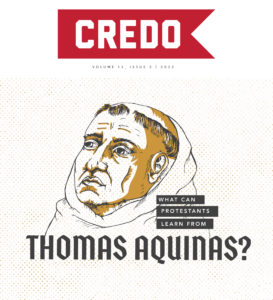
Why did Jerome Zanchi retrieve Thomas Aquinas?
J erome Zanchi (1516-90), an Italian born and leading reformed theologian in the late 16th century Europe, was well known for his scholastic style and his frequent use of Thomas Aquinas (1225-74). Testifying to Zanchi’s scholastic learning and influence on his and later generation of reformed theologians, Church Historian, Otto Gründler (1924-2004) called Zanchi “the father of reformed scholasticism”. However, Gründler did so in a derogatory sense since he thought that Zanchi had returned “to the causal thinking of the scholastics, from which Calvin, for the most part, had successfully freed himself”.[1] Gründler’s evaluation of Zanchi has more or less been rejected in later scholarship. John P. Donnelly, in his important article “Calvinist Thomism” (1976), argued that there is no necessary conflict between Zanchi’s dual theological heritage (Calvin and Aquinas) since Zanchi was “both a better Thomist and a better Calvinist than Gründler makes him”.[2]Zanchi saw Aquinas as a reliable guide to the Christian orthodox tradition on a range of topics, such as natural theology, the doctrine of God, divine providence, the incarnation and theological anthropology. Click To Tweet
erome Zanchi (1516-90), an Italian born and leading reformed theologian in the late 16th century Europe, was well known for his scholastic style and his frequent use of Thomas Aquinas (1225-74). Testifying to Zanchi’s scholastic learning and influence on his and later generation of reformed theologians, Church Historian, Otto Gründler (1924-2004) called Zanchi “the father of reformed scholasticism”. However, Gründler did so in a derogatory sense since he thought that Zanchi had returned “to the causal thinking of the scholastics, from which Calvin, for the most part, had successfully freed himself”.[1] Gründler’s evaluation of Zanchi has more or less been rejected in later scholarship. John P. Donnelly, in his important article “Calvinist Thomism” (1976), argued that there is no necessary conflict between Zanchi’s dual theological heritage (Calvin and Aquinas) since Zanchi was “both a better Thomist and a better Calvinist than Gründler makes him”.[2]Zanchi saw Aquinas as a reliable guide to the Christian orthodox tradition on a range of topics, such as natural theology, the doctrine of God, divine providence, the incarnation and theological anthropology. Click To Tweet
Zanchi saw Aquinas as a reliable guide to the Christian orthodox tradition on a range of topics, such as natural theology, the doctrine of God, divine providence, the incarnation and theological anthropology. There are, of course, other topics in which they disagreed (e.g. biblical interpretation, marriage and the sacraments). Aquinas was used for (i) dogmatic purposes – which is seen in the way that Zanchi ordered doctrinal topics, use of key concepts and arguments – and (ii) apologetic purposes – e.g. against the ubiquitarians and the anti-trinitarians. His use of Aquinas’ ideas was thus eclectic as he appropriated and extended them in the service of reformed orthodox theology. For instance, although Zanchi’s doctrine of God shows close affinity with central aspects Aquinas’ doctrine of God, Zanchi’s introduction to the topic contains aspects that cannot be found in Aquinas theological works, such as a sustained exegetical, dogmatic reflection on the divine names as well as their practical use in life (usus practicus). Similar doctrinal and exegetical and dogmatic discussions are clearly seen in other theological areas where Aquinas is used, like the trinity and the incarnation. Thus, despite Zanchi’s frequent use of Thomistic categories, he was no epigone but a faithful reformed theologian.
[1] “Thomism and Calvinsim in the Theology of Girolamo Zanchi (1516-1590)” (Th.D. dissertation, Princeton Theological Seminary, Princeton, NJ, 1961), 23. Also in German translation, Die Gotteslehre Girolamo Zanchi und ihre Bedeutung für seine Lehre von der Prädestination (Neukirchen-Vluyn, 1965).
[2] John Patrick Donnelly, ‘Calvinist Thomism’, Viator 7 (1976) p. 445.
